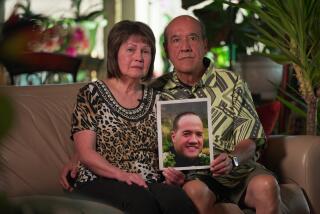Verdict Splits Those Working With O.C. Terminally Ill
- Share via
Those who work with the terminally ill in Orange County were either appalled or thrilled by a Michigan jury verdict Monday that Dr. Jack Kevorkian broke no law by assisting in the suicide of a 30-year-old man with Lou Gehrig’s disease.
The decision was welcomed by those who hope it will advance the cause of freedom of choice for the dying but decried by those who fear it may give doctors a too-easy option to finding ways to relieve the pain of the terminally ill.
“I think that was a very logical and mature decision in light of the status of medical treatment which permits people to live in a situation of pain and suffering far beyond the time they have a meaningful existence,” said Dr. Warren Bostick, former dean of the UC Irvine College of Medicine and former president of the California Medical Assn.
Bostick, who was an outspoken advocate of a failed 1992 ballot initiative to legalize physician-assisted suicide in California, predicted that the Michigan decision is “the beginning of a modest but steady tide that will move from state to state and finally develop the kind of alternative within a framework that will be acceptable to people in general.”
He said that in Holland, the idea of physician-assisted suicide for the terminally ill was accepted by the courts long before the country’s legislators passed enabling legislation. Perhaps, he said, the United States will follow the same path.
But Dr. Ronald B. Miller, director of the Program in Medical Ethics at the UCI College of Medicine, said he believes the jury was mistaken if it was convinced by Kevorkian’s argument that his main objective was to stop his patient’s suffering.
“If one were intending to relieve muscle pain, one would use morphine and not carbon monoxide,” he said. “Carbon monoxide is a lethal gas and not a medication used to relieve pain.”
Miller said while it may be ethically justified for a physician or nurse to increase the dosage of morphine to lessen the pain of a dying patient, even if there is a chance that a higher dose might suppress breathing and hasten death, there is no justification to use carbon monoxide, which will inevitably cause death.
Dr. Melvyn Sterling, president of the Orange County Medical Assn. and director of the Visiting Nurse Assn. of Orange County’s hospice program, said although he opposes the legalization of physician-assisted suicide, he greatly respects Kevorkian and believes he has done a service in making the medical profession more aware of the need to alleviate the pain of the dying.
“I think Dr. Kevorkian is a brave man,” Sterling said. “I think he is a smart man, and he has focused national attention on the problem of providing appropriate palliative care. But I personally think it is more appropriate for us to devote our energies to relieving suffering rather than taking the easy way out.”
Sterling and Miller said while there are methods for relieving the pain of terminally ill patients, many doctors and nurses don’t use them effectively.
“I think the public is speaking loud and clear, and this jury is speaking loud and clear, that we are not doing our job adequately,” Miller said.
Among those who supported the jury decision was Craig B. Coogan, executive director of the Gay and Lesbian Community Services Center of Orange County, who said his position had been shaped in part by his close contact with people suffering from AIDS.
“Definitely, you are more sensitized to what disease does to the human body and human spirit, and this ruling implies those people now have control,” Coogan said. “The implication (of the jury decision) is that people are now being given the dignity to choose how they live and how they die.”
More to Read
Sign up for Essential California
The most important California stories and recommendations in your inbox every morning.
You may occasionally receive promotional content from the Los Angeles Times.













